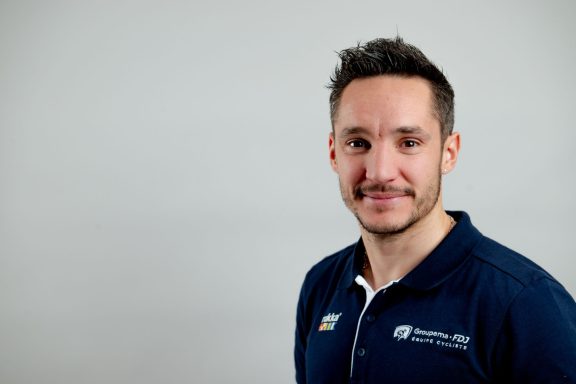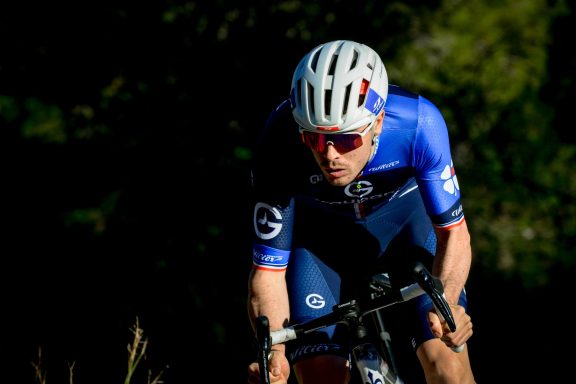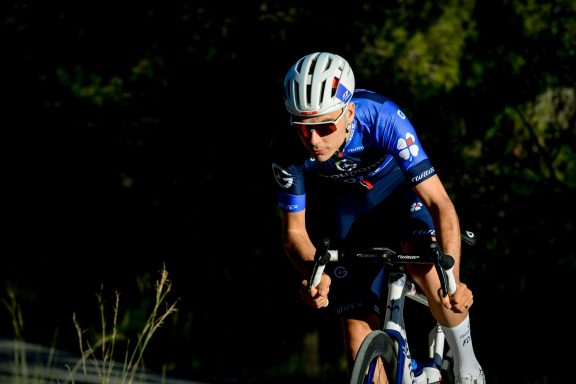A long-time coach within the Groupama-FDJ cycling team, and a performance coordinator until recently, Julien Pinot was named at the head of the organization’s training department over last winter. After a few months, he tells us about his new role, the dynamic he’d like to create, his on-going collaborations with certain riders but also the retirement of his brother and his personal position within the team.
Julien, you became the team’s head coach last winter. How did you get to this position?
There was an overall desire to make some changes within the team to improve the efficiency of our functioning. With the organization growing, Fred [Grappe] had a very broad role and sometimes found himself a bit distant from certain “ground” issues. It was therefore necessary to divide the tasks. He kept the innovation, research & development part, and I personally got the training part. For two years, I had a hybrid position of performance coordinator, which was located between Fred and the other departments. I had no decision-making power, and this could create blockages when it came to making choices on daily matters. A reorganization was welcome from that point of view.
“I had mentioned my wish to have more responsibilities in terms of management”
Did you want to take on more responsibilities?
If we look back, everything happened step by step. This is already my thirteenth season with the team. I arrived as a student, first to work on R&D topics. When I completed my thesis in 2014, I became a full-time coach, while maintaining R&D activity with our partners. Then, when Covid happened, I took a step back and felt that I was at a turning point. I suggested the performance coordinator position to create a better link between what was happening on the ground and the departments’ managers. At the same time, I also wanted to get back to studies and have other experiences in the world of sport. I completed a diploma at the CDES (Centre for Sports’ Law and Economics) in Limoges, which is a famous school, where I undertook management classes. I always liked the training, but I got more and more interested in human relationships and all the dynamics that can exist within a staff to achieve sporting goals. For two years, I trained for this diploma, which is made for high-level athletes or coaches who want to change careers. I really enjoyed it, especially the exchanges and sharing of experiences with other sports. At the same time, I had mentioned to Marc [Madiot], David [Le Bourdiec] and Fred [Grappe] my wish to evolve, to have more responsibilities in terms of management and the opportunity came with the team’s reorganization.
What is the role of the head coach?
I am responsible for managing all the coaches, both from the WorldTour team and from “La Conti”. My goal is also to organize the activity of this department. The first and main mission is to prepare the riders physically for the races. Each rider is trained by a team coach, and my role is to best manage these coach-rider relationships within a team dynamic. This is important because we don’t want the coach-rider couple to be isolated. Everything must be done in service of the team’s goals. At the same time, there is everything relating to training as such, the organization of training camps, and sporting collaboration; you cannot handle race’s line-ups and strategies from one part and training from the other. With Philippe [Mauduit], we have a quite dense and intense collaborative work on this matter. So far, everything is going well. Given that the change occurred quite late this winter, I had already resumed training with certain riders, whom I therefore continue to coach: Stefan, Rudy, Kevin and Clément [Russo]. I still have a full-fledged coaching activity with these four riders, but my role is to look more at the bigger picture.
“Our complementarity is our strength”
What do you want to bring with your new position?
You always want to bring something new, but for sure I’m not going to revolutionize all the work which has been done by Fred and the performance department since 2014. There is continuity. I still want to add my touch and create a slightly different dynamic between the coaches, so that there is even more sharing than before on training topics. I also want to stay close to the field. On a daily basis, the goal is also for the WorldTour and Conti activities to merge much more, in order to work even more as one team, which we already do in the races. The Juniors program will also be included into this work. One of the big missions that I set for myself also concerns scouting and developing the young riders. This is the team’s DNA, and our priority is to keep it. We now cover three categories, and this also has an impact on the training side. We must have a progression plan for the riders we will scout and provide consistency over the very long term. This requires that all coaches have a common foundation and approach, while leaving everyone the opportunity to keep their own specificities. We are all different, and that’s a very good thing. Our complementarity is our strength, and that is something that I’d like to maintain and support even more.
How much flexibility is left to the coaches?
The number 1 resource person for the rider still is the rider’s coach. He is the rider’s preferred contact, the one who he talks daily to. The goal is not for me to have daily contact with the team’s forty riders. My role is to be here for the coach if he needs me, or to step in at certain times to clarify certain situations. My activity is more oriented towards the coach than towards the rider. I obviously have a right to look at the training of the forty riders, and we are then free to discuss what is done but always with a constructive aim. The idea is just to have a common base so that one coach does not find himself light years from what another does, because we would lose credibility. However, we all have our specificities, in human relationships but also in our approach to training, recovery, organization of workloads. Regarding this, it is important that everyone maintains their individual approach and a certain freedom.
“I am against the guru coach philosophy”
How would you define yourself as a coach?
What I insist and I have always insisted on as a coach is to not forget that we are dealing with human beings. It is surely necessary to consider the rider for the training itself, but we also have to consider the human side alongside that. It is important to show empathy and build a trust relationship. New generations have access to training methods from a very young age and know many things, but I’m still convinced that the athletes who have a career and who perform best are those who understand what they are doing and who are able to acquire a certain independence. The coach must only be there to support them, guide them, question or correct at certain moments. I am against the guru coach philosophy, which robotizes the athletes. Within the team, each coach has a different sensitivity, and each rider can therefore find a coach who meets his mentality, character or way of working. I believe more in a balanced model, where we are able to adjust. I think that’s what makes our team unique. The leaders who’ve been in the team had very different characters and tempers, but we were always able to make them perform well over very long periods of time.
Do you want to share your philosophy with your fellow coaches?
I think we are already in line with it because we have worked together for several years. This is our ninth season together with David Han. He knows my approach, but once again, I am not revolutionizing anything because we are continuing what was done with Fred for almost twenty-five years. Anthony Bouillod is the one who I have had the most exchanges with in recent years, because we worked together on R&D activities. He is truly our specialist in optimizing equipment and position related to time trials. Fun fact, Nicolas Boisson was the first athlete I coached, back in 2008. So, there is continuity here too. He has spent a lot of time working with young riders for scouting, developing, setting up “La Conti”, and has been full-time in the WorldTour for two years. We then have the two young coaches for the development team, with Joseph Berlin-Sémon who does a lot of work, particularly in the Juniors/Conti/scouting area, and Maxime Latourte, who coaches at three levels because he has a rider in the Juniors, riders in “La Conti” and also riders in the WorldTour. He has a multidisciplinary approach, having coached in mountain biking. Comparing all these approaches makes things exciting on a daily basis. Everyone brings their own personal touch to make sure that the rider’s follow-up is one of the team’s strengths. Agents often tell us that we are among the top 5 teams in terms of performance support.
“We haven’t yet reached the end of our journey with Stefan”
Are there still many unexplored areas in training?
From this point of view, we work a lot with Fred who, as head of the innovation department, keeps an eye on research activities. He is really on the lookout for what is published in the scientific literature, and he shares everything with us. The connection between training, nutrition, and health support is also becoming increasingly fundamental. We do a lot from this point of view with Lucas Papillon and our second nutritionist who arrived this year, all under Jacky Maillot’s direction. We cannot confine our activity between us, coaches. It is a daily collaboration. We can never say that we are at the end of what we can explore, but as I said previously, even if methods evolve and everything gets more and more precise, we must never forget the human side in all that.
You continue to coach four riders. How do you see these collaborations moving forward?
I didn’t want to stop a relationship that was already established with the training restart. This is also why I continued at least for this year. With Stefan, we also had a little moral agreement when he extended with the team; that of continuing to work together in 2024 as he has great challenges with the team or the Swiss national team. It’s exciting and we haven’t yet reached the end of our journey. As for Rudy, I was already training him in Etupes before he moved to Cofidis. We have had a long relationship and he is one of the team’s road captains. Regarding Kevin, I took him five years ago already and he’s constantly improving, physically and in terms of his position in the team. These projects were still interesting to me. Will I be able to continue to have dual roles in the long term? I don’t know. It’s easier to be a head coach if I don’t have a rider under my responsibilities. There are no conflicts of interest, you’re neutral with an external look. On the other hand, I fear that cutting myself off completely from training also cuts me off from the activities of the coaches under my responsibility. 2024 is a year of transition. We will have to see how things go with the coaches and riders to decide what happens next.
Do you consider yourself responsible for the coaches, or for the forty riders?
Both. Whether positive or negative, I am directly concerned. I am at the heart of the system, whether things go well with what we implement, or whether things go badly, and we need to modify and question some things. That’s the real big difference. Before, I was only responsible for the riders I coached. Now, I am first of all responsible for the seven coaches, and then of the forty riders.
“We know the team’s strengths, and that’s where we must continue to focus on”
However, there is no longer Thibaut… Has his retirement changed anything for you?
Obviously. We had a special relationship, being brothers, on the same team and with one serving the other. It was an extraordinary journey, and the end of his career changed a lot of things. You feel the pressure when you coach a leader, but when the leader is your brother, it is multiplied. When things go well, it’s even more enjoyable, and in complicated times, it’s much harder. The challenge of this situation was to be seen within the team as the coach and not as the brother. I spent a lot of energy so that no one could ever blame me for acting as his brother. I think there are very few examples where this has been pointed out to me, and I’m quite proud of that. I think that having coached other leaders, like Arnaud, helped me. Yet, they could sometimes be rivals in team strategies, but that never caused any problems in my relationship with Arnaud, so I think things were done rather well. I really paid attention to that, and it’s a weight that I no longer have to bear. That said, I wouldn’t rewrite the story any differently. We lived extraordinary things and we each made the team grow in our own way.
Do you realize what has been done since you arrived, and what is left to do?
When I arrived, the team had just moved up to the WorldTour, we didn’t really have world-class leaders who could be in the top 10-15 of the UCI rankings. We have managed to achieve that, we have improved. In recent years, we have entered the top 10 teams’ ranking, we have fought for the win on the Grand Tours, on the Classics, we have won Monuments. I experienced all of this and, I hope, played a role in all of this. We now want this to continue, as we have never gone back until now. Times are certainly eventful, with certain riders who show an extraordinary level and teams with disproportionate financial power. But I want the Groupama-FDJ team to keep its tradition, continuing to build on what it does best. We know the team’s strengths, and that’s where we must continue to focus on: developing young riders, investing in them, supporting them as best we can to try to keep them. We know that the world is moving, and that it is sometimes difficult for us to fight financially, but we still have the relationship and support sides, as well as the human adventure experience. There are few teams in the world where you can find that, and it’s up to us to keep it.



No comment